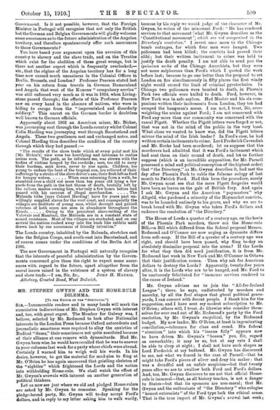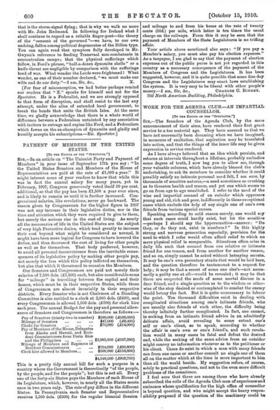MR. STEPHEN GWYNN AND THE . HOME-RULE DILEMMA.
(To THZ EDITOR Or TIM "SPECTATOR:1
SIR,—Innumerable readers and in many lands will mark the cumulative indiscretions of Mr. Stephen Gwynn with interest and, too, with great regret. The Member for Galway was, I believe, selected by Mr. Redmond to look after Nationalist interests in the London Press because Oxford antecedents and journalistic smartness were required to allay the anxieties of Radical "items," their consciences not quite assoilzied because of their alliance at one remove with dynamitards. Had Mr. Gwynn been wise, he would have recalled that he was to answer in your columns last week for a party whose chiefs were abroad. Certainly I warned him to weigh well his words. In his desire, however, to get the material for mud-pies to fling at Mr. O'Brien he has again uncovered that gristling skeleton of the "eighties" which frightened the Lords and the nation into withholding Home-rule. We shall watch the effect of Mr. Gwynn's avowals with interest on another generation of political thinkers Let us now see just where we old and pledged Home-rulers are asked by Mr. Gwynn to remuster. Speaking for the pledge-bound party, Mr. Gwynn will to-day accept Ford's dollars, and in reply to my letter asking. him to walk warily, because by his reply we would judge of the character of Mr. Gwynn, he writes of the miscreant Ford : "He has rendered services to that movement [what Mr. Gwynn describes as the Constitutional movement'] which are not overpraised in the Directory's resolution." I revert once more to the Chicago bomb outrages, for which four men were hanged. Two policemen had been killed ; the convicts had proved their alibi ; but their written incitement to crime was held to justify the death penalty. I am not able to send you the ipsissima verba of the Chicago Anarchists, but they were not more sulphurous than Ford's which I quoted the week before last; because to go one better than the proposal to set London on fire simultaneously in fifty places the first windy night would exceed the limit of criminal pyrotechnics. In Chicago two policemen were bombed to death, in Phoenix Park two officials were knifed to death. Ford, however, in New York was in safe asylum. Had Mosher and his six com- panions written their incitements from London, they too had escaped the hangman's noose. I am not, I trust, Sir, over- weighting the scales against Ford; I am not concerned with Ford any more than our community was concerned with the rascal Pigott. Whether the Pigott letters were forged or not, that was not in the mind of the public in the very least. What alone we wanted to know was, did the Pigott letters mirror the mind of the Irish leader? In Ford's case, he had written certain incitements to crime. Lord Frederick Cavendish and Mr. Burke had been murdered; let us suppose that the murderers had admitted that it was Ford's incitement which had sent them on their errand of death, and let us further suppose (which is an incredible supposition, for Mr. Parnell possessed a mind and political conception of the highest order) that "the Directory," as Mr. Gwynn describes it, had met the day after Phoenix Park to cable the fulsome eulogy of last month to Patrick Ford. Had this been the procedure, surely Mr. Gwynn must see that the mere Pigott forgeries would have been as leaves on the gale of British fury. And again I ask Mr. Gwynn and the American " paymasters " why Altgeld, who pardoned a minority of the Haymarket convicts, was to be hounded untimely to his grave, and why we are to break bread with Mr. Gwynn who takes Ford's dollars and endorses the resolution of "the Directory."
The House of Lords a quarter of a century ago, on the heels of the Phoenix Park murders, threw out the Home-rule Bill,—a Bill which differed from the federal proposal Messrs. Redmond and O'Connor are now urging as dynamite differs from soft-soap. If the Bill of a quarter of a century ago was right, and should have been passed, why fling to-day an absolutely dissimilar proposal into the arena? If the Lords for what they then did need justification, it is from Mr.
Redmond last week in New York and Mr. O'Connor in Ottawa that their justification comes. - Then why ask for American dollars to destroy the Lords ? Apparently, twenty-five years after, it is the Lords who are to be hanged, and Mr. Ford to be unctuously felicitated for "immense services rendered to the cause of Ireland."
Mr. Gwynn advises me to join the "All-for-Ireland League " ; there, he says, undisturbed by murders and anarchy, by all the foul shapes that ghoul political grave- yards, I can consort with decent people. I thank him for the suggestion, and I have sent my modest subscription to Mr. O'Brien; others will, I trust, do likewise who consider them- selves for ever read out of Mr. Redmond's party by the Ford resolution, by Mr. Gwynn's encyclical, by the Redmond budget. My new leader, Mr. O'Brien, at least is ing,eminating conciliation,—tolerance for class and creed. His federal " eirenicon " into which his "insane folly" appears now to have driven Mr. Gwynn's "bosses," you, Sir, regard as unworkable; it may be so, but at any rate I shall be able to sleep at night ; I shall not have such shapes as Lord Frederick at my bedhead. Mr. Gwynn has discovered to me, not what we feared in the case of Parnell—that he might take Ford's pieces of silver and deny his maker : that was a dreadful and an unfair suspicion—but that twenty years after we are to swallow both Ford and Ford's dollars. And, too, Mr. Gwynn discovers to me not that official Home- rule is immoral—that, as all history teaches, is not a danger to States—but that its sponsors are non-moral; that Mr. Gwynn and the enthusiasts of "the Directory" who eulogise "honest extremists" of the Ford type lack the ethical sense. That is the true import of Mr. Gwynn's avowal last week;
that is the storm-signal flying; that is why we walk no more with Mr. John Redmond. In following for Ireland what I shall continue to regard as a reliable finger-post—the theory of the "consent of the governed "—we have, to our own undoing, fallen among political degenerates of the Dillon type. You can again read that symptom fully developed in Mr. Gwynn's reference to feeding Transvaal non-combatants in concentration camps ; that the physical sufferings which follow, in Ford's phrase, " half-a-dozen dynamite shells" or a knife-thrust are negligible by comparison with the sufferings bred of war. What wonder the Lords were frightened ! What wonder, as one of their number declared, "we must make our wills and do our duty."—I am, Sir, &c., X.
[For fear of misconception, we had better perhaps remind our readers that "X." speaks for himself and not for the Spectator. He is a Federalist, and we are strongly opposed to that form of disruption, and shall resist to the last any attempt, under the alias of extended local government, to break the bonds that unite the British Isles. At the same time, we gladly acknowledge that there is a whole world of difference between a Federalism untainted by any association with inciters to outrage and rapine like Ford, and a Federalism which fawns on the ex-champion of dynamite and gladly and humbly accepts his subscriptions.—En. Spectator.]















































 Previous page
Previous page